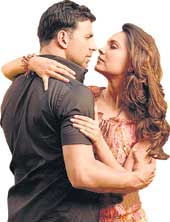 |
 |
| Take 2: Remakes like Ramgopal Varma Ke Sholay (above) and Bhagam Bhag (top) have been under fire over copyright issues |
From Devdas to Don to Umrao Jaan, Bollywood’s been clearly bitten by the remake bug. Many see the remaking of popular Hindi films, including Ram Gopal Verma’s yet-to-be released Ram Gopal Varma Ke Sholay, as nothing but a “creative drought” that Hindi filmdom is reeling under. Not all of them have done well at the box office either. But leaving aside the merit or otherwise of these films, the remakes have also raised a legal question: Do they violate the Copyright Act of 1957?
Not necessarily, say legal experts. After all, the copyright law is complex and often open to interpretation, especially when it comes to films. As Calcutta High Court lawyer Smarajit Roychowdhury puts it, there is a thin line that separates an idea from its expression. In other words, the Act protects the expression of an idea but not the idea itself. And therein lies the rub, lawyers say.
The debate over copyright is not confined to India, however. “It’s going on in different countries,” Calcutta High Court lawyer Ranjan Bachawat says. Some countries like Australia and New Zealand allow copyrights in ideas. “They say it’s an ‘idea’ when it’s in your head but once you put it down on paper, it should have a copyright to prevent someone else from grabbing it and giving it a twist,” Bachawat says. In most countries, however, ideas are not covered under the copyright law.
Section 51 of the Copyright Act defines what constitutes “infringement of copyright” in India, while Section 52 provides a long list of “acts” that do not constitute infringement. A 1978 Supreme Court ruling often serves as the “legal benchmark” in this case, lawyers say.
Dismissing a case filed by one R.G. Anand who had accused Delux Films of making a film based on his play without his permission, the apex court held that “there can be no copyright in an idea, principle, subject matter, themes, plots or historical and legendary facts and (that) violation of the copyright in such cases is confined to the form, manner and arrangement and expression of the idea by the author of the copyrighted work.” In other words, Roychowdhury says the Act will protect the expression of an idea or a concept but not the idea or concept itself.
Lawyers say it’s often hard to prove “where an idea ends and where its expression begins.” The well-publicised Barbara Taylor Bradford case is a classic example. The New York-based novelist sued a television channel in 2004, accusing it of basing a serial on her novel A Woman of Substance. Both the Calcutta High court and the Supreme Court heard the case, with the high court — asked to handle the case by the apex court — eventually allowing the serial’s telecast. Telling an idea from its expression is “often so subjective that it’s hard to determine the violation (of the Copyright Act) objectively in a film,” Bachawat says.
The 1978 Supreme Court ruling has broadly set seven parameters to determine a copyright violation case. It says where the same idea is being developed in a different manner, it’s manifest that the source being common, similarities are bound to occur. In such cases, the apex court holds that the “courts should determine whether or not the similarities are on fundamental or substantial aspects of the mode of expression adopted in the copyrighted work.” The Supreme Court says it would be a violation of the copyright and thus the Act if a “work is nothing but a literal imitation of the copyrighted work with some variations here and there…” But at the same time, it says that if “the theme is the same but is presented and treated differently so that the subsequent work becomes a completely new work, no question of violation of copyright arises.”
Judging by this benchmark, set by the Supreme Court, remakes like Don, a slicker version of the 1978 hit, could hardly be hauled up for copyright violation. “Legally speaking, Shah Rukh Khan’s Don is not the same as Amitabh Bachchan’s Don. It’s a variation, so apparently , there can be no violation of copyright,” says Joymalya Bagchi, a criminal lawyer at the Calcutta High Court, who also deals with the “criminal” aspects of copyright violation cases. Though the Copyright Act is essentially a civil law, an offender can be punished with a prison term anywhere between six months and three years under Section 63 of the Act, besides paying a fine of Rs 50,000 to Rs 2 lakh.
In any case, Bagchi says few in Bollywood “bother about the uniqueness of their works as they often get their own ideas from other films.” Bhagam Bhag, a recent release, is a case in point. Hauled up for lifting the idea from a Malayalam film called Mannar Mathai Speaking, producers of the Bollywood hit have gone for an out-of-court settlement.
Evidently, in Bollywood, it’s not easy for the pot to call the kettle black.










